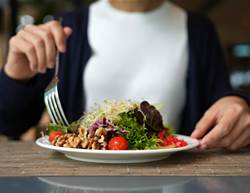Promising dramatic and fast weight loss results with simple rules, fad diets are everywhere, and they just keep coming. You’ve probably tried more than one, because none of them is sustainable long-term.
Fad diets for weight loss are very sneaky and the concept can feel a little bit abstract. No diet calls itself the latest fad, and we often don’t know that’s what they are while we are trying them. With each fad we try we think it might finally be the diet that will work, the one that will be different. And yet the cycle continues, and the harms add up.
So, why are fad diets problematic, how can we spot them, and what should we do instead?
What are fad diets?
There isn’t a standard definition for the term “fad diet”. But generally, they are popular diets that reportedly promote simple, short-term but extreme changes in eating habits, with the promise of rapid and dramatic results, with a particular focus on weight loss.
Fads sound simple, they focus on cutting out certain foods – like quitting sugar, eliminating nightshade vegetables, avoiding dairy or extreme fasting. Or they might say to simply eat only one type of food – like the carnivore diet or the banana diet. Or they might be more complicated, but sound scientific, like blood type diets, ketogenic diets and detoxes.
Fads always have clear, rigid rules and devoted followers ready to espouse their virtues and make big claims. Fads are rarely based on actual scientific evidence, they are rarely sustainable long-term, and are often nutritionally imbalanced. At best, these diets are a waste of time and money. At worst, they are harmful to our health.
Why are fad diets problematic?
Because fad diets are extreme, they are often nutritionally imbalanced. This means that even if we lose weight and “feel better” in the short term, they can be doing us harm in the long term. We focus on weight because it changes quickly, plus, we can see it and measure it easily.
We might ignore the immediate side effects, like:
- Dehydration
- Weakness
- Fatigue
- Nausea
- Headaches
- Constipation
- Irritability
We ignore these side effects because we see those as worth the benefits, or the price we pay.
But fad diets can also create changes we can’t see or feel, like to our:
- Gut microbiota
- Mental health
- Bones
- Blood vessels
- Hormones
The harm caused by these changes might not manifest immediately, so we don’t necessarily connect it to the diets. It’s important to remember that we aren’t just eating for the body we have today or tomorrow, we are eating for the body we will have in our future years and our old age too, so what we do now influences our outcomes later too.
Fad diets also cause mental, social and emotional harm. They suck our time and energy. We spend so much time obsessing about over-hyped trends like apple cider vinegar, clean eating, superfoods, protein water and the latest products and trends that we get distracted from key core changes, like eating more vegetables.
Framing dieting as a short-term intervention, rather than setting up a lifelong positive relationship with food keeps us from making genuine positive changes for our health.
Restriction also takes the joy out of eating. When we are controlled by fad diet rules, we can become isolated around eating, causing us to miss out of the cultural and social aspects of eating. We tend to eat better when we eat with people, but when we have restrictions, we might avoid eating with others. This can damage our relationships with our friends, family and others.
Fad diets are part of a continuous cycle of what we can see as our own dietary failures. Every time we quit a fad diet, or regain the weight afterwards, we blame ourselves, instead of blaming the diet. This damages our trust in our bodies, our decision making and our relationships with food. And then there’s the very slippery slope from fad diets, to disordered eating and eating disorders.
How do we spot and avoid fad diets?
We need to actively work to spot and avoid fad diets. Look out for diets promising dramatic or rapid results, if it sounds too good to be true it probably is. If a diet asks you to cut out whole food groups, or limits eating to very small numbers of foods, it’s probably a fad, and it will be hard to keep things balanced.
Celebrity endorsements, either direct, reported or rumoured, and media hype are also red flags. Finally, does it sound enjoyable? Most fads lead to weight loss simply because they make eating a misery, a challenge or a chore, which just makes eating less appealing overall.
Taking down fad diets is more than just a personal choice responsibility. We need to make some big-picture changes as a society to reduce the long-term impacts of diet culture. But in the short term, when we hear reports on a new diet, we can help protect ourselves by asking questions and examining our own ingrained biases.
Our brains are biased towards the evidence we want to believe, so if we want to lose weight, we are going to be inclined to gloss over the reports that a diet might be harmful. We focus on the potential for a positive outcome, and those pushing fad diets are taking advantage of these instincts.
And then there’s the ‘no pain, no gain’ fallacy and the ‘sacrifice myth’ which lead us to believe that the suffering and misery of highly restrictive diets is necessary to succeed. This connects to a phenomenon called the “unhealthy-tasty intuition” which means we intuitively assume that if foods are healthy, they won’t be tasty or pleasant, so we accept the unpleasantness of the next diet, even though this intuition isn’t founded in facts.
What should we be doing instead?
Following the fad diet rules can give us a sense of control. But if any of these fads actually worked, we wouldn’t be having this conversation, and we wouldn’t have so many seemingly simple options marketed to us.
Unfortunately, the truth is much more complex. There isn’t a one-size-fits-all approach to healthy eating or weight loss. But this is fortunate, too, it means we don’t need to be locked into rules that make us miserable.
It might sound trite and ironically oversimplified, but for healthy eating to be sustainable, it needs to be about balance. Balance doesn’t just mean eating a wide variety of core foods and not too many discretionary foods. Balance is also about not forsaking one element of health, including enjoyment and mental health. To do this, we need flexible approaches, with tools instead of rules,
Where we acknowledge that more than one thing can be true simultaneously. This means we can know vegetables are healthy but don’t need to just eat salad. We can focus on mostly eating nutrient-dense foods while still enjoying a delicious dessert. We can favour core foods and admit when convenience or indulgence improves our wellbeing. We can know that food is fuel and nourishment, and still know it is social and cultural too.
We talk a lot in science about the evidence base, meaning the sum of scientific knowledge, and evidence-based decision-making. But the evidence base needs to be applied in context to be of practical use. Being flexible means that you can choose what is right for you when it is right for you, in your unique context, and make informed decisions, rather than right or wrong ones. This gives us more than one pathway to success, but it also gives us an opportunity to rethink what success is to us.
You don’t need to do it alone
Healthy eating is a journey, that journey will look different for everyone, but you don’t need to go on that journey alone. Sharing your aspirations and challenges with others can help, even though you won’t necessarily find success in the same spaces as other people, and that’s okay. Likewise, when you find your happy and healthy combination, don’t assume that you need to convert other people to your way of eating for their own good.
Regardless of your stage in the journey, you can invite your health professionals in. Seeing a dietitian can be a great way to get practical advice tailored to your situation and your goals. Dietitians are not just for sick people, and they aren’t the food police; their job isn’t just to get you eating well but to help you find the model of healthy eating that works for you.
Dr Emma Beckett is the author of You Are More Than What You Eat, out now.







.jpg&h=193&w=250&c=1&s=1)


